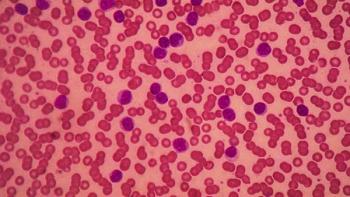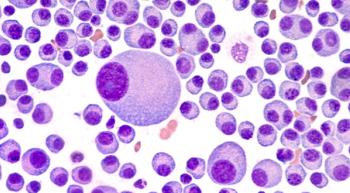
Overall survival results were durable for patients with relapsed/refractory b-cell acute lymphoblastic leukemia when treated with CAR-T cell therapy, Tecartus.

Colleen Moretti, Assistant Editor for CURE®, joined MJH Life Sciences in November 2020. Colleen is a graduate of Monmouth University, where she studied communication with a focus in journalism and public relations. In her free time, she enjoys learning to cook new meals, spending time with her adopted beagle, Molly, or sitting on the beach with a good book. Email her at [email protected]

Overall survival results were durable for patients with relapsed/refractory b-cell acute lymphoblastic leukemia when treated with CAR-T cell therapy, Tecartus.

Patients who are looking to quit smoking to better their survival and health outcomes should talk to their health care team about different methods to do so, an expert said.

Some patients with metastatic non-small cell lung cancer are not receiving effective therapies for their disease, the study authors suggested.

The use of PD-L1 to predict outcomes highlights a possible opportunity to better understand which patients with ER-positive breast cancer may benefit from an immune checkpoint inhibitor.

Data suggests an association between tumor DNA circulating in plasma and patient responses to neoadjuvant treatment.

A new tool may identify more patients with cancer who can benefit from immunotherapy.

If approved by the FDA later this year, momelotinib could fulfill an area of unmet need for patients with myelofibrosis, according to an expert.

A new standard of care for advanced pancreatic neuroendocrine tumors demonstrates improvements in survival and tumor shrinkage.

Patients with refractory metastatic colorectal cancer often don’t have many effective treatment options, although immunotherapy may be a promising potential for patients based on recent study findings.

Efficacy with robotic surgery in early-stage cervical cancer is currently being studied, to hopefully offer patients an option with better recovery compared to open surgery.

Chemoradiotherapy may be an appropriate treatment option after surgery for patients with stage 3 endometrial cancer, especially those are a higher risk of recurrence.

The treatment previously demonstrated significantly improved overall survival for patients with recurrent glioblastoma in a phase 1 study.

The Food and Drug Administration approved Orserdu for patients with ER-positive, HER2-negative, ESR1-mutated advanced or metastatic breast cancer.

The multicenter study is evaluating the safety and efficacy of nanrilkefusp alfa combined with Erbitux.

The trial is evaluating the safety and efficacy of AVB-001 patients with relapsed refractory ovarian cancer.

Compared with CT based radiotherapy, MRI-guided treatment resulted in fewer side effects for patients with prostate cancer.

Patients with blood cancer may develop serious infections after transplants, but a T-cell therapy may improve symptoms and side effects.

Treatment for breast cancer, such a chemotherapy, may cause a decline in working memory, processing speed, attention and more for patients.

Investigators have administered Keytruda and ONC-392 the first patients with platinum resistant ovarian cancer.

A phase 2 trial evaluating EVX-01 plus Keytruda (pembrolizumab) in patients with metastatic melanoma may continue, the FDA said.

AAV2-hAQP1 was safe and effective in treating patients with dry mouth symptoms, which is often a result of some cancer treatments like radiation, according to phase 1 study results.

The targeted therapy appeared to be safe and effective in treating patients with KRAS G12C mutated pancreatic cancer, according to results from a recent study.

Patients with non-muscle invasive bladder cancer who currently smoke or previously smoked should consider quitting to possibly improve health outcomes in survivorship, according to an expert.

The combination met its main goal of progression-free survival and secondary goal of overall survival.

As a part of its “Speaking Out” video series, CURE® spoke with Meryl Uranga, on behalf of KidneyCAN, about the importance of working as a team with their clinicians and getting educated before making decisions.

Although triplet therapy may be effective and tolerable for patients with BRAF-mutant melanoma, each patient’s case should be considered before deciding if it is the right course of treatment, according to an expert.

Some patients are at higher risk of infection, so it’s critical that they keep their care team up to date on any symptoms.

The past 20 years have brought great advances to advocacy groups, helping to improve patients’ quality of life. But more work is needed to raise awareness in underserved groups.

It is important that caregivers take care of not only the patient, but also themselves, as the diagnosis may affect their mental health.

If approved by the FDA, zanidatamab could be the first HER-2 targeted therapy for patients with biliary tract cancers.